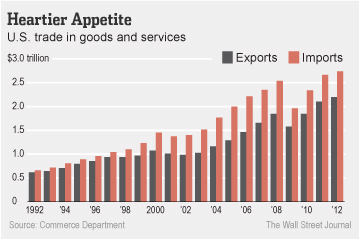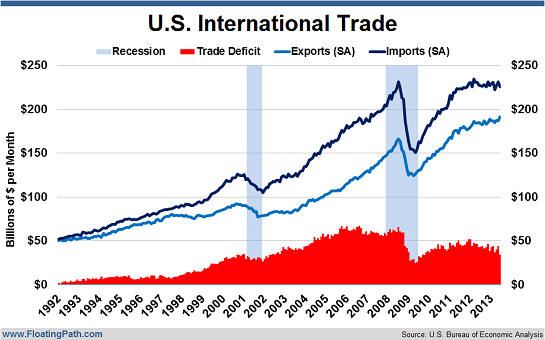All those counting on a weaker dollar and rising U.S. corporate profits will be doubly surprised.
That the U.S. trade deficit shrank to $34 billion in June is being presented as good news all around (no surprise there, as all news is presented as good news). The petroleum boom in the U.S. has pushed oil imports down by over $2 billion a month to $10 billion/month, and non-petroleum trade generated a deficit of $37 billion/month, down $5 billion.
Nice, except nobody is talking about the negative consequences of a shrinking trade deficit on U.S. corporate profits. The financial media doesn't talk about this because it doesn't understand the connection, which is based on Triffin's Paradox, a dynamic I have discussed in depth a number of times:
The basic idea here is that the world's reserve currency must expand to meet the needs of global trade. Most commentators view the U.S. dollar through the prism of the domestic economy: Federal Reserve money-printing increases the supply of dollars, depreciating its value, and this policy is intended to competitively devalue the dollar to increase U.S. exports.
Here's the heart of Triffin's Paradox: Triffin's Paradox: when one nation's fiat currency is used as the world's reserve currency, the needs of the global trading community are different from the needs of domestic policy makers.
Understood in this light, rising U.S. trade deficits in the 1990s and 2000s were required to provide enough dollars to lubricate rising global trade:
Trading nations need dollars to lubricate trading and as foreign exchange reserves that bolster the value of their own currency and provide the asset base for the expansion of credit within their own nation.
What does a declining trade deficit mean? It means fewer dollars are being exported. The global economy is about $60 trillion, of which about 25% is the U.S. economy. Into this vast sea of trade, the U.S. "exports" about $400-500 billion in U.S. dollars via the trade deficit. Put in perspective, it isn't that big compared to the machine it is lubricating. (That is $250 billion less than was "exported" in 2006.)
So what happens when there are fewer dollars being exported? Demand for existing dollars goes up, pushing the "price" of dollars up--basic supply and demand.
How does a rising dollar impact U.S. corporate profits? Most large U.S. global corporations already earn 60+% of their revenues overseas, in other currencies. As the dollar weakened, global corporate profits skyrocketed as earnings in euros, yen, etc. rose when stated in dollars.
As the U.S. dollar strengthens, overseas profits will decline when stated in dollars. Shrinking trade deficits means fewer dollars exported into the global economy, which means demand for dollars for trade, reserves and to pay debts denominated in dollars will face shrinking supply. That will drive the "price" of dollars higher.
As the price of dollars rise, U.S. corporate profits will decline as all the goods and services sold overseas in other currencies are converted (at least for accounting purposes) into U.S. dollars.
Be careful what you wish for. Shrinking trade deficits may appear to be positive for the domestic economy, but they won't be positive for a stock market dependent on profits generated by global corporations who earn 50%-60% of their revenues overseas: a rising dollar driven by declining trade deficits will re-set the stock market downward along with corporate profits.
All those counting on a weaker dollar and rising U.S. corporate profits will be doubly surprised.
Things are falling apart--that is obvious. But why are they falling apart? The reasons are complex and global. Our economy and society have structural problems that cannot be solved by adding debt to debt. We are becoming poorer, not just from financial over-reach, but from fundamental forces that are not easy to identify or understand. We will cover the five core reasons why things are falling apart:
 1. Debt and financialization
1. Debt and financialization
2. Crony capitalism and the elimination of accountability
3. Diminishing returns
4. Centralization
5. Technological, financial and demographic changes in our economy
Complex systems weakened by diminishing returns collapse under their own weight and are replaced by systems that are simpler, faster and affordable. If we cling to the old ways, our system will disintegrate. If we want sustainable prosperity rather than collapse, we must embrace a new model that is Decentralized, Adaptive, Transparent and Accountable (DATA).
We are not powerless. Not accepting responsibility and being powerless are two sides of the same coin: once we accept responsibility, we become powerful.
Kindle edition: $9.95 print edition: $24 on Amazon.com
To receive a 20% discount on the print edition: $19.20 (retail $24), follow the link, open a Createspace account and enter discount code SJRGPLAB. (This is the only way I can offer a discount.)
| Thank you, Bernard B. ($25), for your remarkably generous contribution to this site -- I am greatly honored by your support and readership. | | Thank you, Sardar N. ($5), for your most generous contribution to this site -- I am greatly honored by your support and readership. |


 1. Debt and financialization
1. Debt and financialization


























